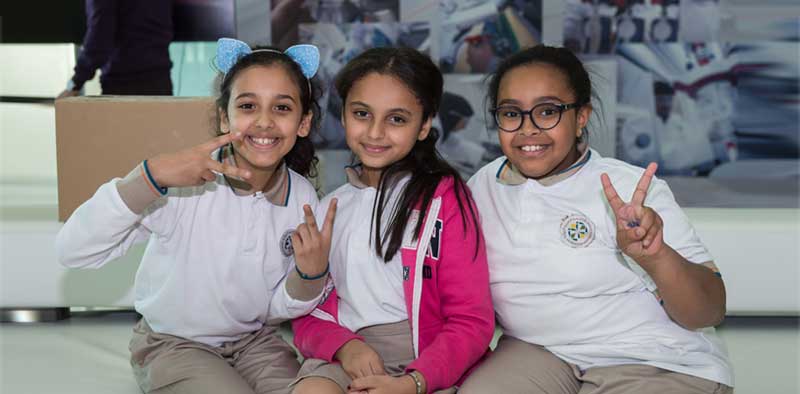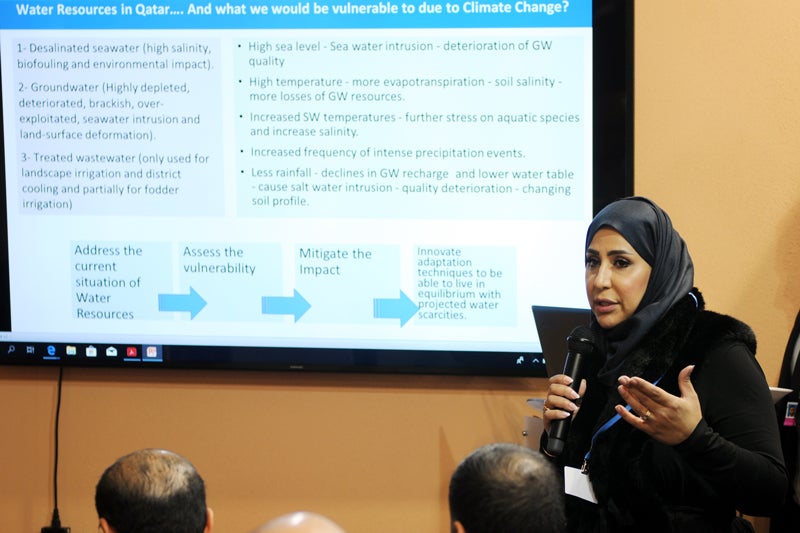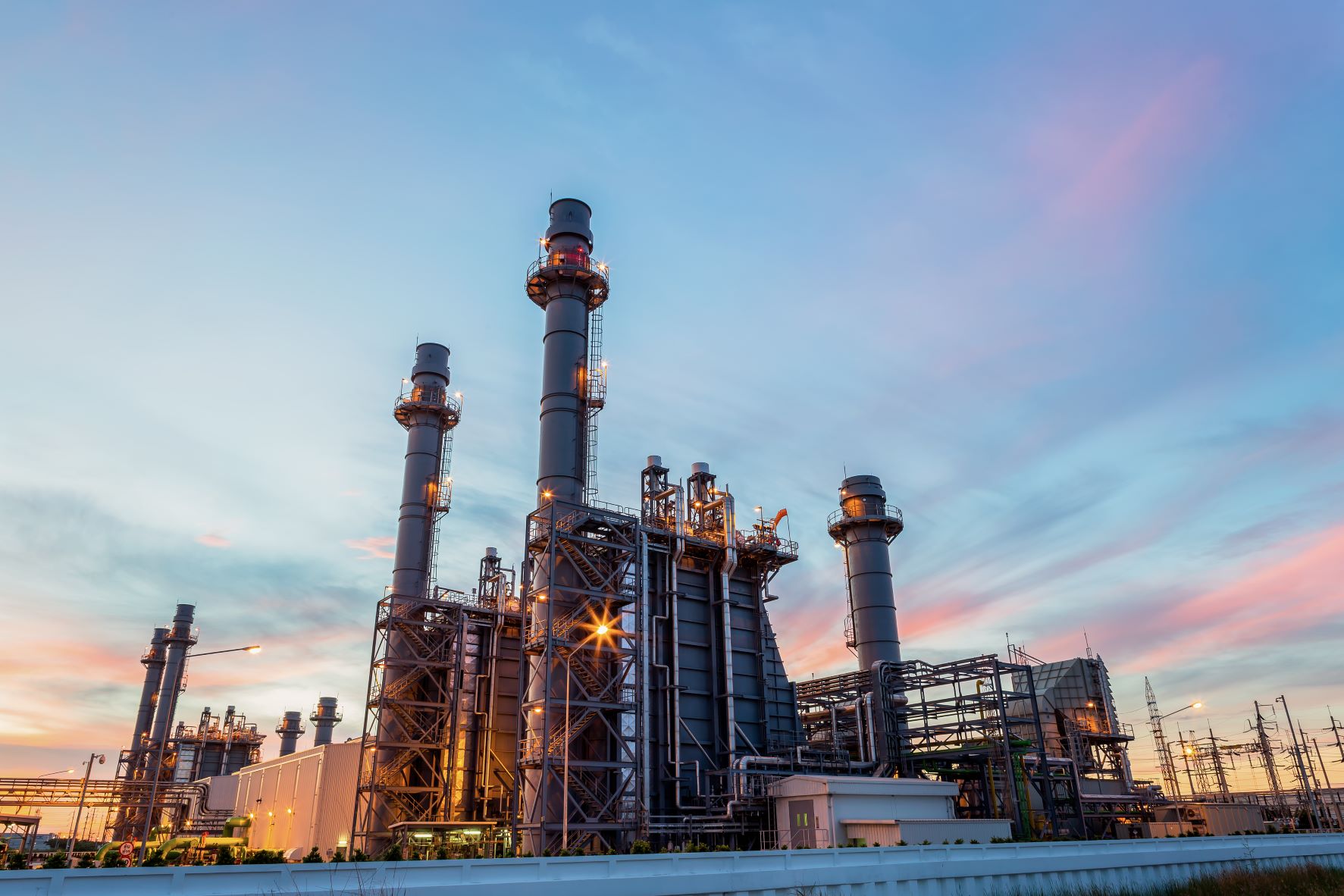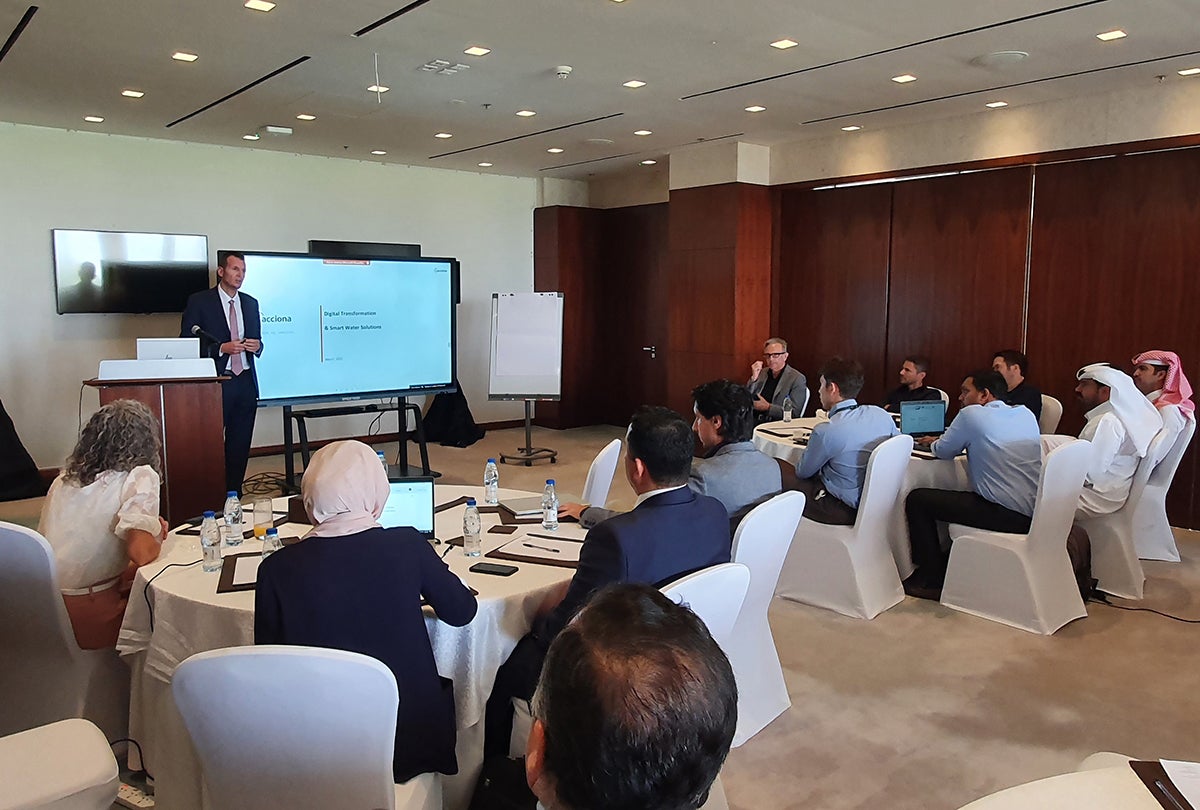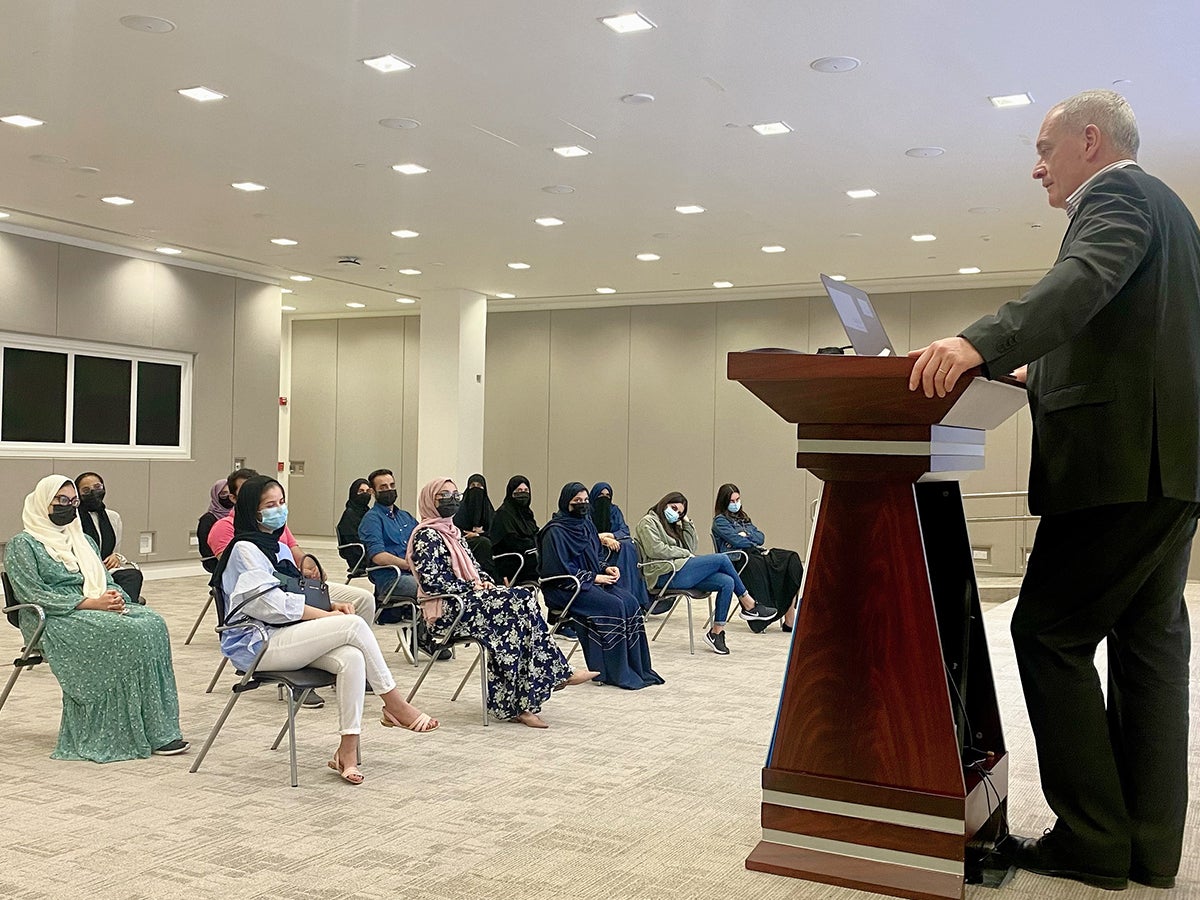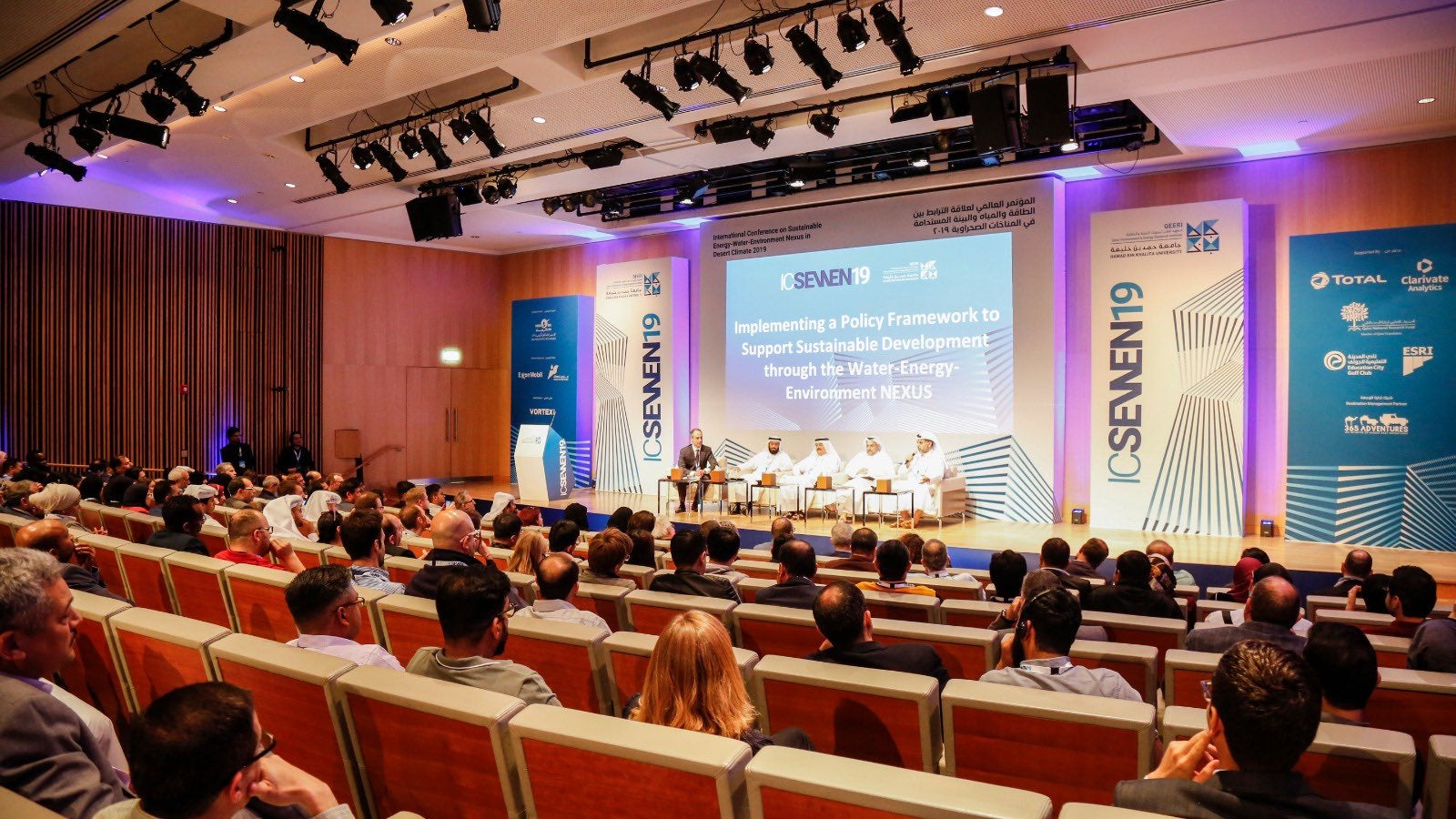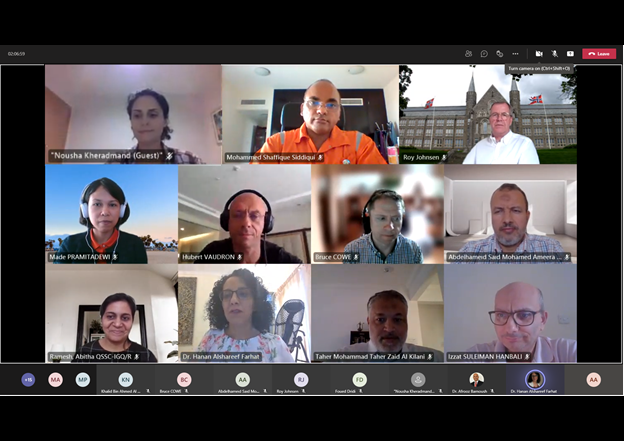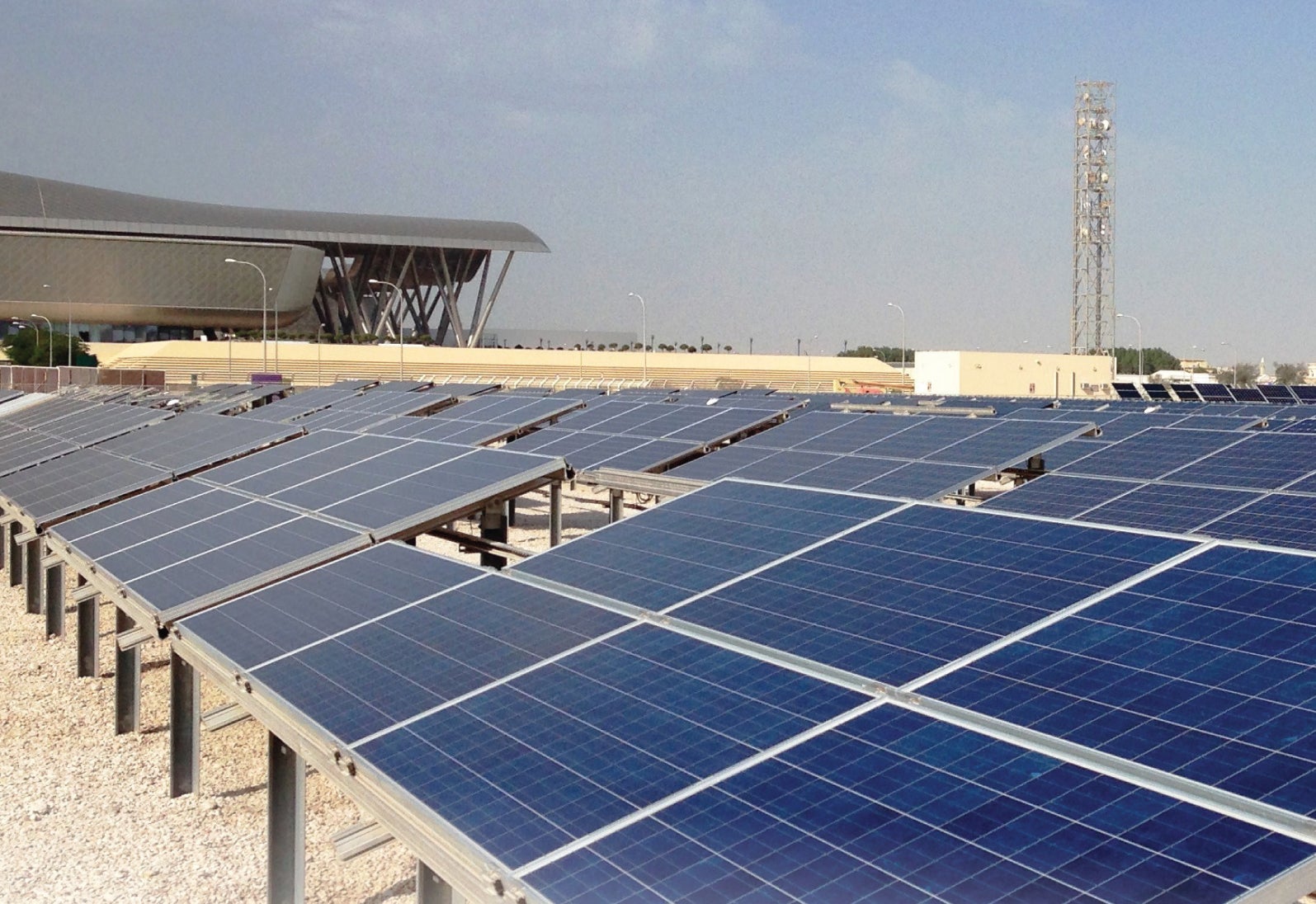
Qatar Environment and Energy Research Institute Holds Science Majlis to Tackle the Challenges of Corrosion
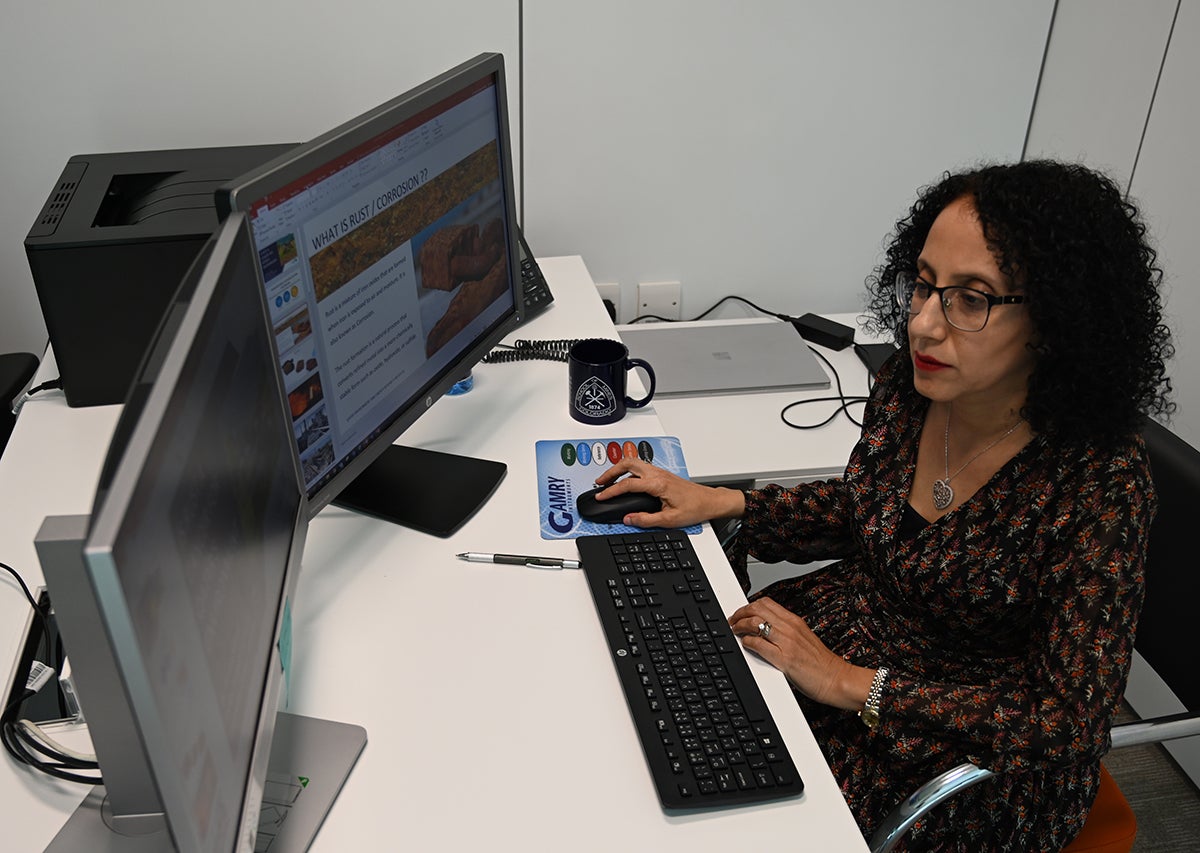
Qatar Environment and Energy Research Institute (QEERI), part of Hamad Bin Khalifa University (HBKU), recently organized its first Science Majlis of 2021, titled ‘Is Corrosion a Cancer for Qatar’s Environment?’, as part of the institute’s goal to raise awareness among the community on research related to energy, water, and environmental grand challenges.
The event, which was held online, featured a talk by Dr. Hanan Farhat, Senior Research Director of QEERI’s Corrosion Center. Highlighting that corrosion costs the region millions of dollars each year, Dr. Farhat outlined how its challenges can be mitigated. She discussed corrosion and the sustainability of urban and industrial infrastructure, the impact of the region’s environmental conditions on the corrosion of metallic alloys, corrosion management, and protection. She also outlined the research that QEERI’s Corrosion Center is doing in this field, including work on coating, corrosion inhibitors, pipeline integrity management, reinforced concrete corrosion, and corrosion under insulation.
Science Majlis provides a platform for experts from QEERI and members of the community to engage in informal discussions on energy, water, and environment topics relevant to the country. The forum is designed to actively engage attendees of all ages, by offering them an insight into the research carried out at QEERI, making it more accessible and better understood.
Dr. Marc Vermeersch, Executive Director, QEERI, said: “At QEERI, we believe in collaboration at all levels, and the Majlis is our way to share what we do with the community and to hear their feedback. This two-way dialogue helps us understand their perspective on the challenges related to energy, environment, and water, and in turn, allows us to further customize our research to provide tangible solutions for Qatar and beyond.”
Commenting after the Science Majlis, Dr. Farhat said: “Corrosion is one of those topics which often go under the radar, despite the fact that it is pervasive and affects everything around us. Qatar, with its unique environment with the high temperatures, dust, humidity, and salinity needs customized solutions related to corrosion, and we believe it is important to create awareness among the community living here on the subject. It was a very interesting discussion with students, industry players, and members of the public who attended the event and we look forward to continuing this information exchange.”
She added: “Having the Science Majlis online gives us the additional benefit of hearing from communities beyond Qatar, and that definitely added value to the discussion. We heard about corrosion mitigation practices that are happening outside of Qatar too.”
One of the international attendees, Rajah Kousikan, based in India, found the Science Majlis to be an enlightening experience. “The various hypotheses, statistics, field reality, observations, and information about corrosion and environmental conditions that were put forward was impressive. I was personally delighted as it was not just about hearing from QEERI’s corrosion expert but also about sharing insights that we know: in that way, it was truly a sharing of ideas and learning from each other,” he said.
QEERI is committed to its mission of creating awareness about the research in energy, water and environment in Qatar, and continues to organize multiple community and outreach events. The next Science Majlis is planned for June 2021 and will feature Dr. Jenny Lawler, Senior Research Director, Water Center.
For more information on the work of Qatar Environment and Energy Research Institute, please visit qeeri.hbku.edu.qa.
Related News
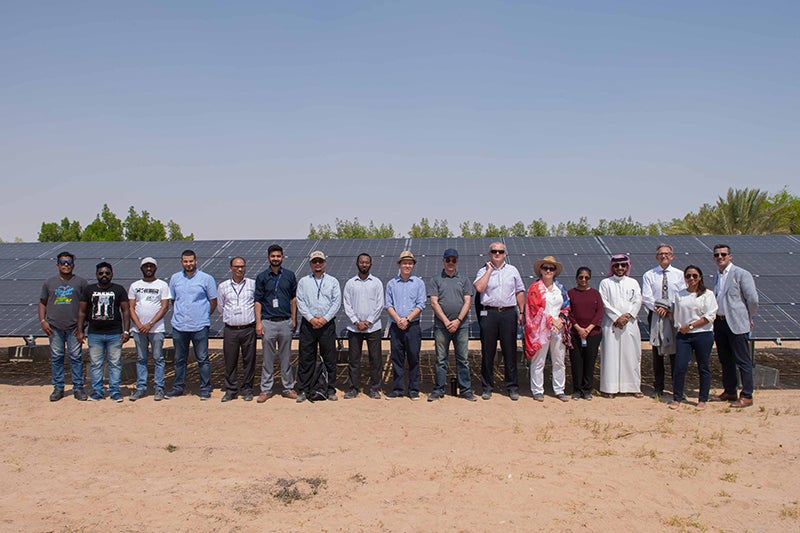
HBKU’s QEERI Launches Pilot Project to Supply Sustainable Energy to Farms in Qatar
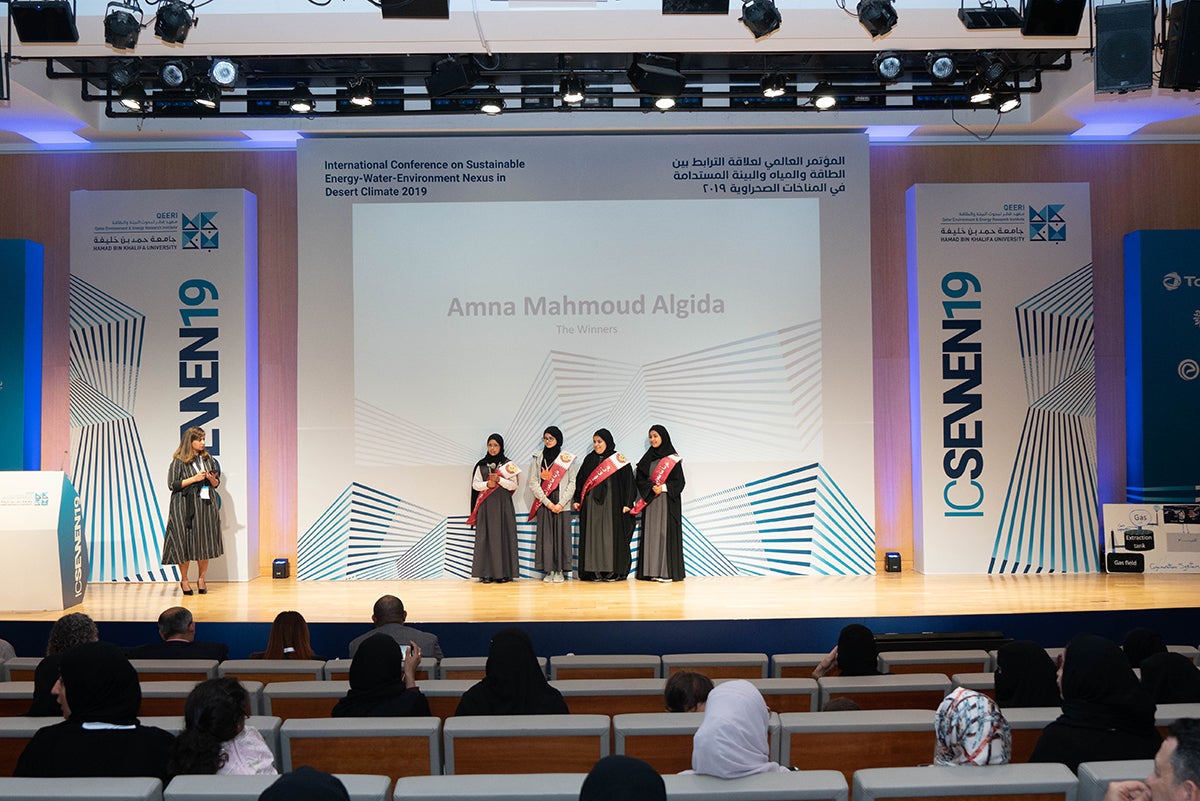
Third Edition of QEERI’s Young Innovator Awards Invites Youth to Create New Solutions and Enhance Sustainability for Arid Environments

HBKU’s Qatar Environment and Energy Research Institute Hosts ISO Meeting to Discuss Worldwide Corrosion Standards for Oil and Gas Industry
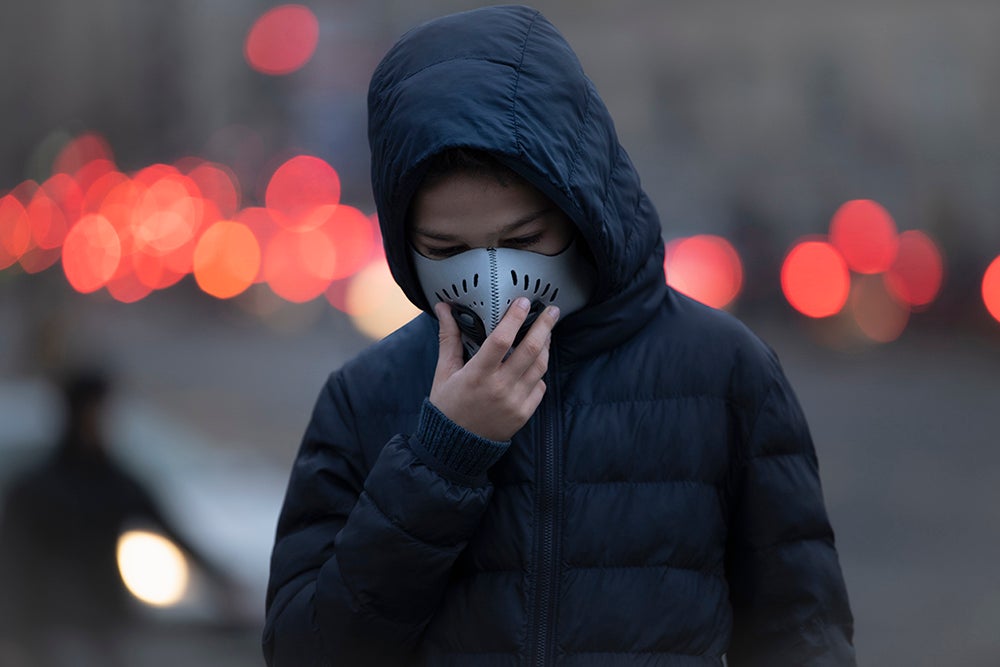
Air Quality in focus for SC collaboration with HBKU’s Qatar Environment and Energy Research Institute (QEERI)
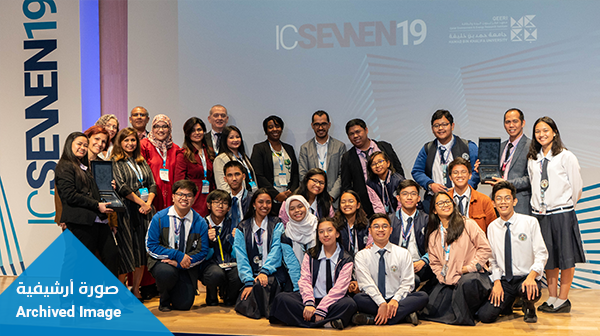
HBKU’s Qatar Environment and Energy Research Institute Announces Young Innovator Awards Competition 2020
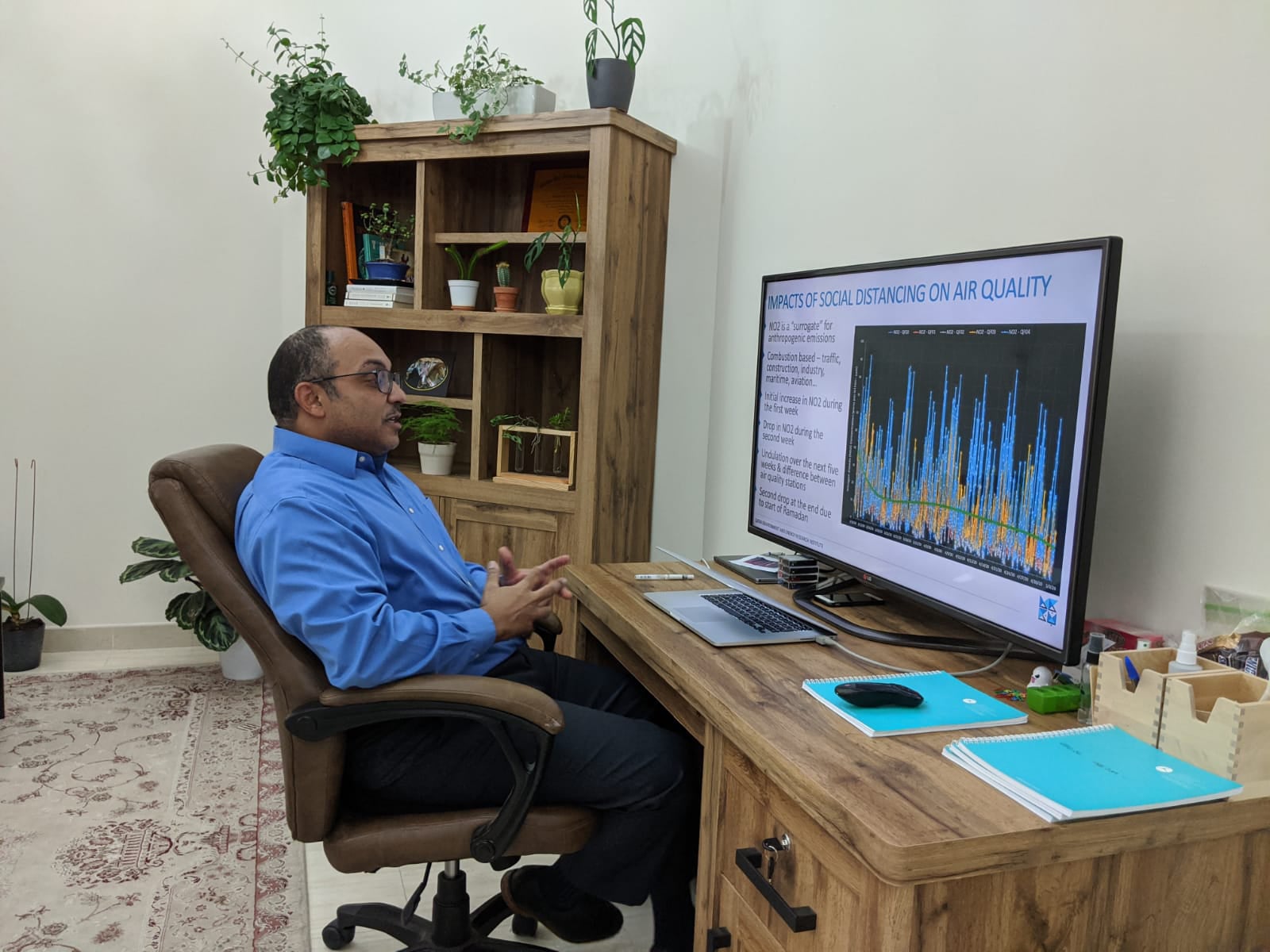
HBKU’s Qatar Environment and Energy Research Institute COVID-19 Webinar Series Tackles Impact on Natural Resources
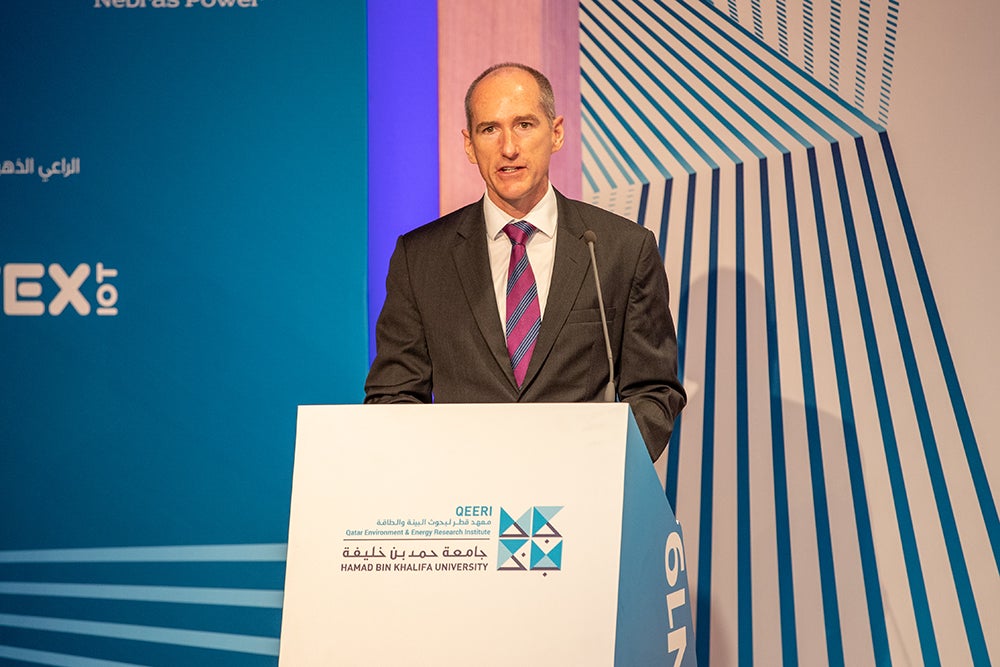
Qatar Environment and Energy Research Institute Conference Tackles Desert Climate Challenges
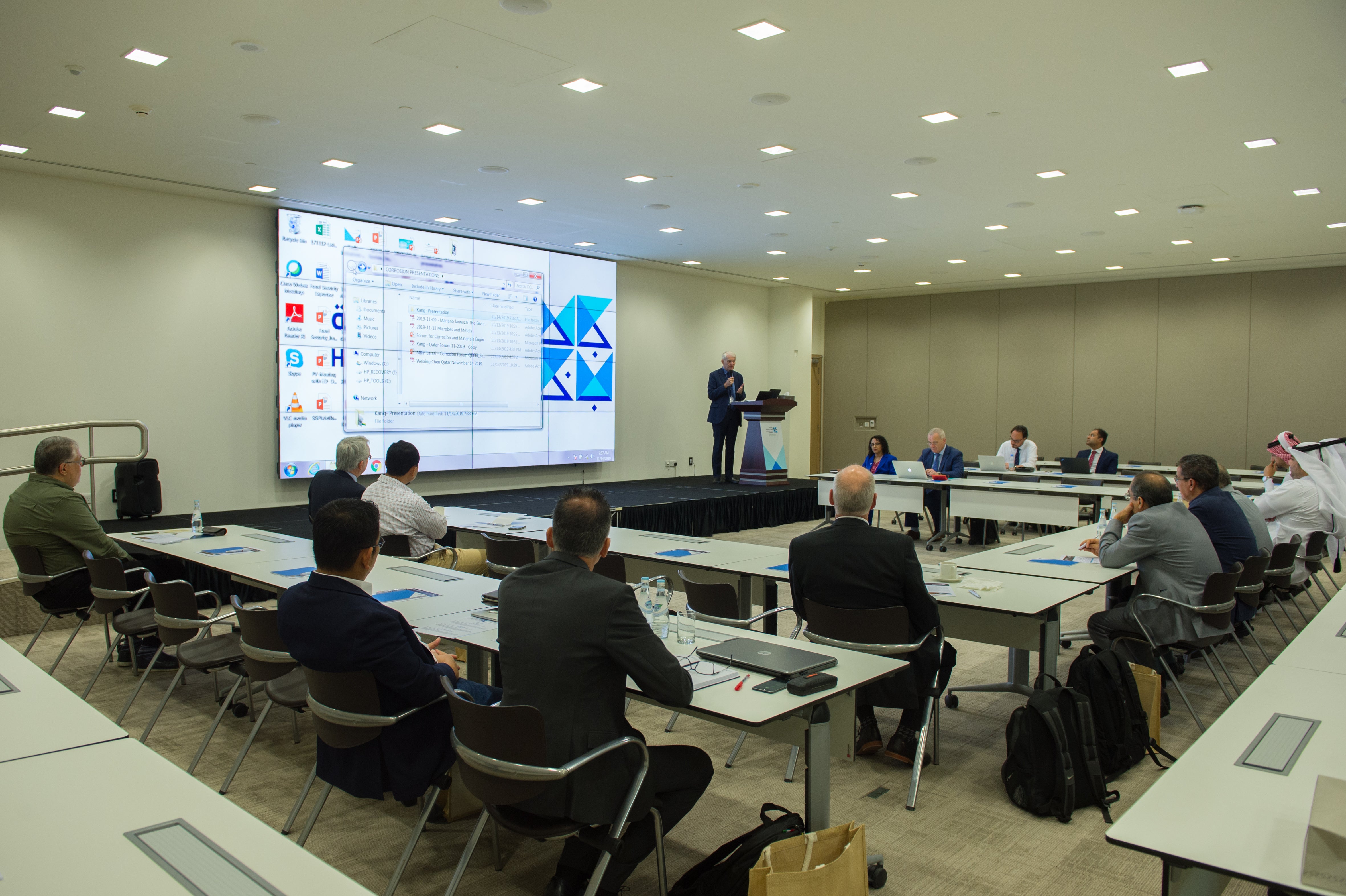
QEERI’s Newly Launched Corrosion Center Organizes Forum to Tackle Impact of Corrosion on Environment

HBKU’s QEERI Launches Pilot Project to Supply Sustainable Energy to Farms in Qatar

Third Edition of QEERI’s Young Innovator Awards Invites Youth to Create New Solutions and Enhance Sustainability for Arid Environments

HBKU’s Qatar Environment and Energy Research Institute Hosts ISO Meeting to Discuss Worldwide Corrosion Standards for Oil and Gas Industry

Air Quality in focus for SC collaboration with HBKU’s Qatar Environment and Energy Research Institute (QEERI)

HBKU’s Qatar Environment and Energy Research Institute Announces Young Innovator Awards Competition 2020

HBKU’s Qatar Environment and Energy Research Institute COVID-19 Webinar Series Tackles Impact on Natural Resources

Qatar Environment and Energy Research Institute Conference Tackles Desert Climate Challenges

QEERI’s Newly Launched Corrosion Center Organizes Forum to Tackle Impact of Corrosion on Environment

HBKU’s QEERI Launches Pilot Project to Supply Sustainable Energy to Farms in Qatar

Third Edition of QEERI’s Young Innovator Awards Invites Youth to Create New Solutions and Enhance Sustainability for Arid Environments

HBKU’s Qatar Environment and Energy Research Institute Hosts ISO Meeting to Discuss Worldwide Corrosion Standards for Oil and Gas Industry

Air Quality in focus for SC collaboration with HBKU’s Qatar Environment and Energy Research Institute (QEERI)

HBKU’s Qatar Environment and Energy Research Institute Announces Young Innovator Awards Competition 2020

HBKU’s Qatar Environment and Energy Research Institute COVID-19 Webinar Series Tackles Impact on Natural Resources

Qatar Environment and Energy Research Institute Conference Tackles Desert Climate Challenges

QEERI’s Newly Launched Corrosion Center Organizes Forum to Tackle Impact of Corrosion on Environment

HBKU’s QEERI Launches Pilot Project to Supply Sustainable Energy to Farms in Qatar

Third Edition of QEERI’s Young Innovator Awards Invites Youth to Create New Solutions and Enhance Sustainability for Arid Environments

HBKU’s Qatar Environment and Energy Research Institute Hosts ISO Meeting to Discuss Worldwide Corrosion Standards for Oil and Gas Industry

Air Quality in focus for SC collaboration with HBKU’s Qatar Environment and Energy Research Institute (QEERI)

HBKU’s Qatar Environment and Energy Research Institute Announces Young Innovator Awards Competition 2020

HBKU’s Qatar Environment and Energy Research Institute COVID-19 Webinar Series Tackles Impact on Natural Resources

Qatar Environment and Energy Research Institute Conference Tackles Desert Climate Challenges

QEERI’s Newly Launched Corrosion Center Organizes Forum to Tackle Impact of Corrosion on Environment

HBKU’s QEERI Launches Pilot Project to Supply Sustainable Energy to Farms in Qatar

Third Edition of QEERI’s Young Innovator Awards Invites Youth to Create New Solutions and Enhance Sustainability for Arid Environments

HBKU’s Qatar Environment and Energy Research Institute Hosts ISO Meeting to Discuss Worldwide Corrosion Standards for Oil and Gas Industry

Air Quality in focus for SC collaboration with HBKU’s Qatar Environment and Energy Research Institute (QEERI)

HBKU’s Qatar Environment and Energy Research Institute Announces Young Innovator Awards Competition 2020

HBKU’s Qatar Environment and Energy Research Institute COVID-19 Webinar Series Tackles Impact on Natural Resources

Qatar Environment and Energy Research Institute Conference Tackles Desert Climate Challenges

QEERI’s Newly Launched Corrosion Center Organizes Forum to Tackle Impact of Corrosion on Environment

HBKU’s QEERI Launches Pilot Project to Supply Sustainable Energy to Farms in Qatar

Third Edition of QEERI’s Young Innovator Awards Invites Youth to Create New Solutions and Enhance Sustainability for Arid Environments

HBKU’s Qatar Environment and Energy Research Institute Hosts ISO Meeting to Discuss Worldwide Corrosion Standards for Oil and Gas Industry

Air Quality in focus for SC collaboration with HBKU’s Qatar Environment and Energy Research Institute (QEERI)

HBKU’s Qatar Environment and Energy Research Institute Announces Young Innovator Awards Competition 2020

HBKU’s Qatar Environment and Energy Research Institute COVID-19 Webinar Series Tackles Impact on Natural Resources

Qatar Environment and Energy Research Institute Conference Tackles Desert Climate Challenges

QEERI’s Newly Launched Corrosion Center Organizes Forum to Tackle Impact of Corrosion on Environment

HBKU’s QEERI Launches Pilot Project to Supply Sustainable Energy to Farms in Qatar

Third Edition of QEERI’s Young Innovator Awards Invites Youth to Create New Solutions and Enhance Sustainability for Arid Environments

HBKU’s Qatar Environment and Energy Research Institute Hosts ISO Meeting to Discuss Worldwide Corrosion Standards for Oil and Gas Industry

Air Quality in focus for SC collaboration with HBKU’s Qatar Environment and Energy Research Institute (QEERI)

HBKU’s Qatar Environment and Energy Research Institute Announces Young Innovator Awards Competition 2020

HBKU’s Qatar Environment and Energy Research Institute COVID-19 Webinar Series Tackles Impact on Natural Resources

Qatar Environment and Energy Research Institute Conference Tackles Desert Climate Challenges

QEERI’s Newly Launched Corrosion Center Organizes Forum to Tackle Impact of Corrosion on Environment

HBKU’s QEERI Launches Pilot Project to Supply Sustainable Energy to Farms in Qatar

Third Edition of QEERI’s Young Innovator Awards Invites Youth to Create New Solutions and Enhance Sustainability for Arid Environments

HBKU’s Qatar Environment and Energy Research Institute Hosts ISO Meeting to Discuss Worldwide Corrosion Standards for Oil and Gas Industry

Air Quality in focus for SC collaboration with HBKU’s Qatar Environment and Energy Research Institute (QEERI)

HBKU’s Qatar Environment and Energy Research Institute Announces Young Innovator Awards Competition 2020

HBKU’s Qatar Environment and Energy Research Institute COVID-19 Webinar Series Tackles Impact on Natural Resources

Qatar Environment and Energy Research Institute Conference Tackles Desert Climate Challenges

QEERI’s Newly Launched Corrosion Center Organizes Forum to Tackle Impact of Corrosion on Environment

HBKU’s QEERI Launches Pilot Project to Supply Sustainable Energy to Farms in Qatar

Third Edition of QEERI’s Young Innovator Awards Invites Youth to Create New Solutions and Enhance Sustainability for Arid Environments

HBKU’s Qatar Environment and Energy Research Institute Hosts ISO Meeting to Discuss Worldwide Corrosion Standards for Oil and Gas Industry

Air Quality in focus for SC collaboration with HBKU’s Qatar Environment and Energy Research Institute (QEERI)

HBKU’s Qatar Environment and Energy Research Institute Announces Young Innovator Awards Competition 2020

HBKU’s Qatar Environment and Energy Research Institute COVID-19 Webinar Series Tackles Impact on Natural Resources

Qatar Environment and Energy Research Institute Conference Tackles Desert Climate Challenges

QEERI’s Newly Launched Corrosion Center Organizes Forum to Tackle Impact of Corrosion on Environment

HBKU’s QEERI Launches Pilot Project to Supply Sustainable Energy to Farms in Qatar

Third Edition of QEERI’s Young Innovator Awards Invites Youth to Create New Solutions and Enhance Sustainability for Arid Environments

HBKU’s Qatar Environment and Energy Research Institute Hosts ISO Meeting to Discuss Worldwide Corrosion Standards for Oil and Gas Industry

Air Quality in focus for SC collaboration with HBKU’s Qatar Environment and Energy Research Institute (QEERI)

HBKU’s Qatar Environment and Energy Research Institute Announces Young Innovator Awards Competition 2020

HBKU’s Qatar Environment and Energy Research Institute COVID-19 Webinar Series Tackles Impact on Natural Resources

Qatar Environment and Energy Research Institute Conference Tackles Desert Climate Challenges

QEERI’s Newly Launched Corrosion Center Organizes Forum to Tackle Impact of Corrosion on Environment

HBKU’s QEERI Launches Pilot Project to Supply Sustainable Energy to Farms in Qatar

Third Edition of QEERI’s Young Innovator Awards Invites Youth to Create New Solutions and Enhance Sustainability for Arid Environments

HBKU’s Qatar Environment and Energy Research Institute Hosts ISO Meeting to Discuss Worldwide Corrosion Standards for Oil and Gas Industry

Air Quality in focus for SC collaboration with HBKU’s Qatar Environment and Energy Research Institute (QEERI)

HBKU’s Qatar Environment and Energy Research Institute Announces Young Innovator Awards Competition 2020

HBKU’s Qatar Environment and Energy Research Institute COVID-19 Webinar Series Tackles Impact on Natural Resources

Qatar Environment and Energy Research Institute Conference Tackles Desert Climate Challenges

QEERI’s Newly Launched Corrosion Center Organizes Forum to Tackle Impact of Corrosion on Environment

HBKU’s QEERI Launches Pilot Project to Supply Sustainable Energy to Farms in Qatar

Third Edition of QEERI’s Young Innovator Awards Invites Youth to Create New Solutions and Enhance Sustainability for Arid Environments

HBKU’s Qatar Environment and Energy Research Institute Hosts ISO Meeting to Discuss Worldwide Corrosion Standards for Oil and Gas Industry

Air Quality in focus for SC collaboration with HBKU’s Qatar Environment and Energy Research Institute (QEERI)

HBKU’s Qatar Environment and Energy Research Institute Announces Young Innovator Awards Competition 2020

HBKU’s Qatar Environment and Energy Research Institute COVID-19 Webinar Series Tackles Impact on Natural Resources

Qatar Environment and Energy Research Institute Conference Tackles Desert Climate Challenges

QEERI’s Newly Launched Corrosion Center Organizes Forum to Tackle Impact of Corrosion on Environment

HBKU’s QEERI Launches Pilot Project to Supply Sustainable Energy to Farms in Qatar

Third Edition of QEERI’s Young Innovator Awards Invites Youth to Create New Solutions and Enhance Sustainability for Arid Environments

HBKU’s Qatar Environment and Energy Research Institute Hosts ISO Meeting to Discuss Worldwide Corrosion Standards for Oil and Gas Industry

Air Quality in focus for SC collaboration with HBKU’s Qatar Environment and Energy Research Institute (QEERI)

HBKU’s Qatar Environment and Energy Research Institute Announces Young Innovator Awards Competition 2020

HBKU’s Qatar Environment and Energy Research Institute COVID-19 Webinar Series Tackles Impact on Natural Resources

Qatar Environment and Energy Research Institute Conference Tackles Desert Climate Challenges

QEERI’s Newly Launched Corrosion Center Organizes Forum to Tackle Impact of Corrosion on Environment

HBKU’s QEERI Launches Pilot Project to Supply Sustainable Energy to Farms in Qatar

Third Edition of QEERI’s Young Innovator Awards Invites Youth to Create New Solutions and Enhance Sustainability for Arid Environments

HBKU’s Qatar Environment and Energy Research Institute Hosts ISO Meeting to Discuss Worldwide Corrosion Standards for Oil and Gas Industry

Air Quality in focus for SC collaboration with HBKU’s Qatar Environment and Energy Research Institute (QEERI)

HBKU’s Qatar Environment and Energy Research Institute Announces Young Innovator Awards Competition 2020

HBKU’s Qatar Environment and Energy Research Institute COVID-19 Webinar Series Tackles Impact on Natural Resources

Qatar Environment and Energy Research Institute Conference Tackles Desert Climate Challenges

QEERI’s Newly Launched Corrosion Center Organizes Forum to Tackle Impact of Corrosion on Environment

HBKU’s QEERI Launches Pilot Project to Supply Sustainable Energy to Farms in Qatar

Third Edition of QEERI’s Young Innovator Awards Invites Youth to Create New Solutions and Enhance Sustainability for Arid Environments

HBKU’s Qatar Environment and Energy Research Institute Hosts ISO Meeting to Discuss Worldwide Corrosion Standards for Oil and Gas Industry

Air Quality in focus for SC collaboration with HBKU’s Qatar Environment and Energy Research Institute (QEERI)

HBKU’s Qatar Environment and Energy Research Institute Announces Young Innovator Awards Competition 2020

HBKU’s Qatar Environment and Energy Research Institute COVID-19 Webinar Series Tackles Impact on Natural Resources

Qatar Environment and Energy Research Institute Conference Tackles Desert Climate Challenges

QEERI’s Newly Launched Corrosion Center Organizes Forum to Tackle Impact of Corrosion on Environment

HBKU’s QEERI Launches Pilot Project to Supply Sustainable Energy to Farms in Qatar

Third Edition of QEERI’s Young Innovator Awards Invites Youth to Create New Solutions and Enhance Sustainability for Arid Environments

HBKU’s Qatar Environment and Energy Research Institute Hosts ISO Meeting to Discuss Worldwide Corrosion Standards for Oil and Gas Industry

Air Quality in focus for SC collaboration with HBKU’s Qatar Environment and Energy Research Institute (QEERI)

HBKU’s Qatar Environment and Energy Research Institute Announces Young Innovator Awards Competition 2020

HBKU’s Qatar Environment and Energy Research Institute COVID-19 Webinar Series Tackles Impact on Natural Resources

Qatar Environment and Energy Research Institute Conference Tackles Desert Climate Challenges

QEERI’s Newly Launched Corrosion Center Organizes Forum to Tackle Impact of Corrosion on Environment

HBKU’s QEERI Launches Pilot Project to Supply Sustainable Energy to Farms in Qatar

Third Edition of QEERI’s Young Innovator Awards Invites Youth to Create New Solutions and Enhance Sustainability for Arid Environments

HBKU’s Qatar Environment and Energy Research Institute Hosts ISO Meeting to Discuss Worldwide Corrosion Standards for Oil and Gas Industry

Air Quality in focus for SC collaboration with HBKU’s Qatar Environment and Energy Research Institute (QEERI)

HBKU’s Qatar Environment and Energy Research Institute Announces Young Innovator Awards Competition 2020

HBKU’s Qatar Environment and Energy Research Institute COVID-19 Webinar Series Tackles Impact on Natural Resources

Qatar Environment and Energy Research Institute Conference Tackles Desert Climate Challenges

QEERI’s Newly Launched Corrosion Center Organizes Forum to Tackle Impact of Corrosion on Environment

HBKU’s QEERI Launches Pilot Project to Supply Sustainable Energy to Farms in Qatar

Third Edition of QEERI’s Young Innovator Awards Invites Youth to Create New Solutions and Enhance Sustainability for Arid Environments

HBKU’s Qatar Environment and Energy Research Institute Hosts ISO Meeting to Discuss Worldwide Corrosion Standards for Oil and Gas Industry

Air Quality in focus for SC collaboration with HBKU’s Qatar Environment and Energy Research Institute (QEERI)

HBKU’s Qatar Environment and Energy Research Institute Announces Young Innovator Awards Competition 2020

HBKU’s Qatar Environment and Energy Research Institute COVID-19 Webinar Series Tackles Impact on Natural Resources

Qatar Environment and Energy Research Institute Conference Tackles Desert Climate Challenges

QEERI’s Newly Launched Corrosion Center Organizes Forum to Tackle Impact of Corrosion on Environment

HBKU’s QEERI Launches Pilot Project to Supply Sustainable Energy to Farms in Qatar

Third Edition of QEERI’s Young Innovator Awards Invites Youth to Create New Solutions and Enhance Sustainability for Arid Environments

HBKU’s Qatar Environment and Energy Research Institute Hosts ISO Meeting to Discuss Worldwide Corrosion Standards for Oil and Gas Industry

Air Quality in focus for SC collaboration with HBKU’s Qatar Environment and Energy Research Institute (QEERI)

HBKU’s Qatar Environment and Energy Research Institute Announces Young Innovator Awards Competition 2020

HBKU’s Qatar Environment and Energy Research Institute COVID-19 Webinar Series Tackles Impact on Natural Resources

Qatar Environment and Energy Research Institute Conference Tackles Desert Climate Challenges

QEERI’s Newly Launched Corrosion Center Organizes Forum to Tackle Impact of Corrosion on Environment

HBKU’s QEERI Launches Pilot Project to Supply Sustainable Energy to Farms in Qatar

Third Edition of QEERI’s Young Innovator Awards Invites Youth to Create New Solutions and Enhance Sustainability for Arid Environments

HBKU’s Qatar Environment and Energy Research Institute Hosts ISO Meeting to Discuss Worldwide Corrosion Standards for Oil and Gas Industry

Air Quality in focus for SC collaboration with HBKU’s Qatar Environment and Energy Research Institute (QEERI)

HBKU’s Qatar Environment and Energy Research Institute Announces Young Innovator Awards Competition 2020

HBKU’s Qatar Environment and Energy Research Institute COVID-19 Webinar Series Tackles Impact on Natural Resources

Qatar Environment and Energy Research Institute Conference Tackles Desert Climate Challenges

QEERI’s Newly Launched Corrosion Center Organizes Forum to Tackle Impact of Corrosion on Environment

HBKU’s QEERI Launches Pilot Project to Supply Sustainable Energy to Farms in Qatar

Third Edition of QEERI’s Young Innovator Awards Invites Youth to Create New Solutions and Enhance Sustainability for Arid Environments

HBKU’s Qatar Environment and Energy Research Institute Hosts ISO Meeting to Discuss Worldwide Corrosion Standards for Oil and Gas Industry

Air Quality in focus for SC collaboration with HBKU’s Qatar Environment and Energy Research Institute (QEERI)

HBKU’s Qatar Environment and Energy Research Institute Announces Young Innovator Awards Competition 2020

HBKU’s Qatar Environment and Energy Research Institute COVID-19 Webinar Series Tackles Impact on Natural Resources

Qatar Environment and Energy Research Institute Conference Tackles Desert Climate Challenges

QEERI’s Newly Launched Corrosion Center Organizes Forum to Tackle Impact of Corrosion on Environment

HBKU’s QEERI Launches Pilot Project to Supply Sustainable Energy to Farms in Qatar

Third Edition of QEERI’s Young Innovator Awards Invites Youth to Create New Solutions and Enhance Sustainability for Arid Environments

HBKU’s Qatar Environment and Energy Research Institute Hosts ISO Meeting to Discuss Worldwide Corrosion Standards for Oil and Gas Industry

Air Quality in focus for SC collaboration with HBKU’s Qatar Environment and Energy Research Institute (QEERI)

HBKU’s Qatar Environment and Energy Research Institute Announces Young Innovator Awards Competition 2020

HBKU’s Qatar Environment and Energy Research Institute COVID-19 Webinar Series Tackles Impact on Natural Resources

Qatar Environment and Energy Research Institute Conference Tackles Desert Climate Challenges

QEERI’s Newly Launched Corrosion Center Organizes Forum to Tackle Impact of Corrosion on Environment

HBKU’s QEERI Launches Pilot Project to Supply Sustainable Energy to Farms in Qatar

Third Edition of QEERI’s Young Innovator Awards Invites Youth to Create New Solutions and Enhance Sustainability for Arid Environments

HBKU’s Qatar Environment and Energy Research Institute Hosts ISO Meeting to Discuss Worldwide Corrosion Standards for Oil and Gas Industry

Air Quality in focus for SC collaboration with HBKU’s Qatar Environment and Energy Research Institute (QEERI)

HBKU’s Qatar Environment and Energy Research Institute Announces Young Innovator Awards Competition 2020

HBKU’s Qatar Environment and Energy Research Institute COVID-19 Webinar Series Tackles Impact on Natural Resources

Qatar Environment and Energy Research Institute Conference Tackles Desert Climate Challenges

QEERI’s Newly Launched Corrosion Center Organizes Forum to Tackle Impact of Corrosion on Environment

HBKU’s QEERI Launches Pilot Project to Supply Sustainable Energy to Farms in Qatar

Third Edition of QEERI’s Young Innovator Awards Invites Youth to Create New Solutions and Enhance Sustainability for Arid Environments

HBKU’s Qatar Environment and Energy Research Institute Hosts ISO Meeting to Discuss Worldwide Corrosion Standards for Oil and Gas Industry

Air Quality in focus for SC collaboration with HBKU’s Qatar Environment and Energy Research Institute (QEERI)

HBKU’s Qatar Environment and Energy Research Institute Announces Young Innovator Awards Competition 2020

HBKU’s Qatar Environment and Energy Research Institute COVID-19 Webinar Series Tackles Impact on Natural Resources

Qatar Environment and Energy Research Institute Conference Tackles Desert Climate Challenges

QEERI’s Newly Launched Corrosion Center Organizes Forum to Tackle Impact of Corrosion on Environment

HBKU’s QEERI Launches Pilot Project to Supply Sustainable Energy to Farms in Qatar

Third Edition of QEERI’s Young Innovator Awards Invites Youth to Create New Solutions and Enhance Sustainability for Arid Environments

HBKU’s Qatar Environment and Energy Research Institute Hosts ISO Meeting to Discuss Worldwide Corrosion Standards for Oil and Gas Industry

Air Quality in focus for SC collaboration with HBKU’s Qatar Environment and Energy Research Institute (QEERI)

HBKU’s Qatar Environment and Energy Research Institute Announces Young Innovator Awards Competition 2020

HBKU’s Qatar Environment and Energy Research Institute COVID-19 Webinar Series Tackles Impact on Natural Resources

Qatar Environment and Energy Research Institute Conference Tackles Desert Climate Challenges

QEERI’s Newly Launched Corrosion Center Organizes Forum to Tackle Impact of Corrosion on Environment

HBKU’s QEERI Launches Pilot Project to Supply Sustainable Energy to Farms in Qatar

Third Edition of QEERI’s Young Innovator Awards Invites Youth to Create New Solutions and Enhance Sustainability for Arid Environments

HBKU’s Qatar Environment and Energy Research Institute Hosts ISO Meeting to Discuss Worldwide Corrosion Standards for Oil and Gas Industry

Air Quality in focus for SC collaboration with HBKU’s Qatar Environment and Energy Research Institute (QEERI)

HBKU’s Qatar Environment and Energy Research Institute Announces Young Innovator Awards Competition 2020

HBKU’s Qatar Environment and Energy Research Institute COVID-19 Webinar Series Tackles Impact on Natural Resources

Qatar Environment and Energy Research Institute Conference Tackles Desert Climate Challenges

QEERI’s Newly Launched Corrosion Center Organizes Forum to Tackle Impact of Corrosion on Environment

HBKU’s QEERI Launches Pilot Project to Supply Sustainable Energy to Farms in Qatar

Third Edition of QEERI’s Young Innovator Awards Invites Youth to Create New Solutions and Enhance Sustainability for Arid Environments

HBKU’s Qatar Environment and Energy Research Institute Hosts ISO Meeting to Discuss Worldwide Corrosion Standards for Oil and Gas Industry

Air Quality in focus for SC collaboration with HBKU’s Qatar Environment and Energy Research Institute (QEERI)

HBKU’s Qatar Environment and Energy Research Institute Announces Young Innovator Awards Competition 2020

HBKU’s Qatar Environment and Energy Research Institute COVID-19 Webinar Series Tackles Impact on Natural Resources

Qatar Environment and Energy Research Institute Conference Tackles Desert Climate Challenges

QEERI’s Newly Launched Corrosion Center Organizes Forum to Tackle Impact of Corrosion on Environment

HBKU’s QEERI Launches Pilot Project to Supply Sustainable Energy to Farms in Qatar

Third Edition of QEERI’s Young Innovator Awards Invites Youth to Create New Solutions and Enhance Sustainability for Arid Environments

HBKU’s Qatar Environment and Energy Research Institute Hosts ISO Meeting to Discuss Worldwide Corrosion Standards for Oil and Gas Industry

Air Quality in focus for SC collaboration with HBKU’s Qatar Environment and Energy Research Institute (QEERI)

HBKU’s Qatar Environment and Energy Research Institute Announces Young Innovator Awards Competition 2020

HBKU’s Qatar Environment and Energy Research Institute COVID-19 Webinar Series Tackles Impact on Natural Resources

Qatar Environment and Energy Research Institute Conference Tackles Desert Climate Challenges

QEERI’s Newly Launched Corrosion Center Organizes Forum to Tackle Impact of Corrosion on Environment

HBKU’s QEERI Launches Pilot Project to Supply Sustainable Energy to Farms in Qatar

Third Edition of QEERI’s Young Innovator Awards Invites Youth to Create New Solutions and Enhance Sustainability for Arid Environments

HBKU’s Qatar Environment and Energy Research Institute Hosts ISO Meeting to Discuss Worldwide Corrosion Standards for Oil and Gas Industry

Air Quality in focus for SC collaboration with HBKU’s Qatar Environment and Energy Research Institute (QEERI)

HBKU’s Qatar Environment and Energy Research Institute Announces Young Innovator Awards Competition 2020

HBKU’s Qatar Environment and Energy Research Institute COVID-19 Webinar Series Tackles Impact on Natural Resources

Qatar Environment and Energy Research Institute Conference Tackles Desert Climate Challenges

QEERI’s Newly Launched Corrosion Center Organizes Forum to Tackle Impact of Corrosion on Environment

HBKU’s QEERI Launches Pilot Project to Supply Sustainable Energy to Farms in Qatar

Third Edition of QEERI’s Young Innovator Awards Invites Youth to Create New Solutions and Enhance Sustainability for Arid Environments

HBKU’s Qatar Environment and Energy Research Institute Hosts ISO Meeting to Discuss Worldwide Corrosion Standards for Oil and Gas Industry

Air Quality in focus for SC collaboration with HBKU’s Qatar Environment and Energy Research Institute (QEERI)

HBKU’s Qatar Environment and Energy Research Institute Announces Young Innovator Awards Competition 2020

HBKU’s Qatar Environment and Energy Research Institute COVID-19 Webinar Series Tackles Impact on Natural Resources

Qatar Environment and Energy Research Institute Conference Tackles Desert Climate Challenges

QEERI’s Newly Launched Corrosion Center Organizes Forum to Tackle Impact of Corrosion on Environment

HBKU’s QEERI Launches Pilot Project to Supply Sustainable Energy to Farms in Qatar

Third Edition of QEERI’s Young Innovator Awards Invites Youth to Create New Solutions and Enhance Sustainability for Arid Environments

HBKU’s Qatar Environment and Energy Research Institute Hosts ISO Meeting to Discuss Worldwide Corrosion Standards for Oil and Gas Industry

Air Quality in focus for SC collaboration with HBKU’s Qatar Environment and Energy Research Institute (QEERI)

HBKU’s Qatar Environment and Energy Research Institute Announces Young Innovator Awards Competition 2020

HBKU’s Qatar Environment and Energy Research Institute COVID-19 Webinar Series Tackles Impact on Natural Resources

Qatar Environment and Energy Research Institute Conference Tackles Desert Climate Challenges

QEERI’s Newly Launched Corrosion Center Organizes Forum to Tackle Impact of Corrosion on Environment

HBKU’s QEERI Launches Pilot Project to Supply Sustainable Energy to Farms in Qatar

Third Edition of QEERI’s Young Innovator Awards Invites Youth to Create New Solutions and Enhance Sustainability for Arid Environments

HBKU’s Qatar Environment and Energy Research Institute Hosts ISO Meeting to Discuss Worldwide Corrosion Standards for Oil and Gas Industry

Air Quality in focus for SC collaboration with HBKU’s Qatar Environment and Energy Research Institute (QEERI)

HBKU’s Qatar Environment and Energy Research Institute Announces Young Innovator Awards Competition 2020

HBKU’s Qatar Environment and Energy Research Institute COVID-19 Webinar Series Tackles Impact on Natural Resources

Qatar Environment and Energy Research Institute Conference Tackles Desert Climate Challenges

QEERI’s Newly Launched Corrosion Center Organizes Forum to Tackle Impact of Corrosion on Environment






